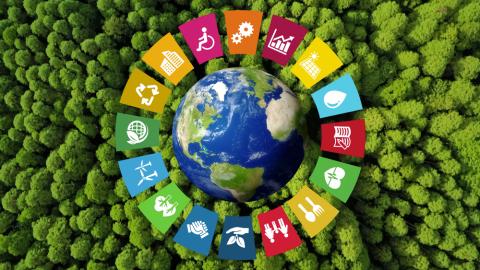European Economic
and Social Committee
Speech on 'A post-COVID economy that works for all: towards a well-being economy' by Diversity Europe Group President Séamus Boland
EESC plenary debate on 7 July 2021
Esteemed speakers, dear colleagues,
At the entrance to the temple of Apollo at Delphi in Ancient Greece, pilgrims were greeted with the inscription "Know Thyself". The implication was that the average person was ignorant of their true self and hence, was ignorant of their true happiness.
Today, sociologists are of the opinion that close knit family ties and communities have a greater impact on our well-being and happiness, than money and wealth. There is also general acceptance that an individual's well-being is determined by the correlation between objective conditions and subjective expectations. Following this logic, one could argue that the immense improvements in material conditions for Europeans over the last two centuries, have been offset by the collapse of the family and community…
Ladies and gentlemen, it really is an immense pleasure for me that we are debating this topic here at the plenary of the EESC and that this subject is gathering momentum at the EU level. I am proud to say that Group III already addressed this subject several years ago. In 2014 we organised a conference called 'Let's Talk Happiness: beyond GDP', which looked at this idea of 'Building Back Better', in the aftermath of the financial and economic crisis.
However, today, I think that the reflections on this topic more mature. They have been fuelled by an honest evaluation of the mistakes made during that crisis, when very tough austerity measures were imposed on Member States.
And we must remember that Article 3 of the Treaty on the European Union states and I quote: …(that)
the Union's aim is to promote peace, its values and the well-being of its peoples
. It is my firm belief that societal progress and an economy that works for all, can only be achieved through a transition to an alternative model of development. And this development must be firmly rooted in the SDGs.
In the 21st century, with the complex and interrelated global challenges, GDP simply an insufficient condition and does not indicate whether economic development is sustainable, nor how the benefits are shared within society. I believe that it is imperative to shift attention from a system of 'production-oriented' measurement to one focused on the disposable income of households, which is financially measurable. In parallel, indicators 'beyond GDP' should be measured, such as quality of life, environmental sustainability, social cohesion, health and the overall well-being of current and future generations.
And I believe that this approach will bring tangible benefits to all sectors of society. Because investment in social cohesion, sustainable development, human capital and quality of life, will be instrumental in creating and driving employment, wealth, and sustainable growth in the future.
Indeed, indicators beyond GDP should become instruments not only to monitor and measure, but to also inform policy development, improve communication and encourage target setting. Crucially, they should encourage a holistic and integrated approach to policy making.
Dear colleagues, I will conclude by saying that there is no time to waste. These are not new ideas. The Stiglitz report published in 2009 put forward bold new ways of thinking about our economy and about how to measure and manage progress. The COVID-19 pandemic now provides us with an opportunity to really embrace change. It is an opportunity to embrace a new paradigm for development, which will also bring citizens closer to the EU. That is not an opportunity that we cannot afford to miss!
Work organisation
Downloads
-
Speech by Séamus Boland
